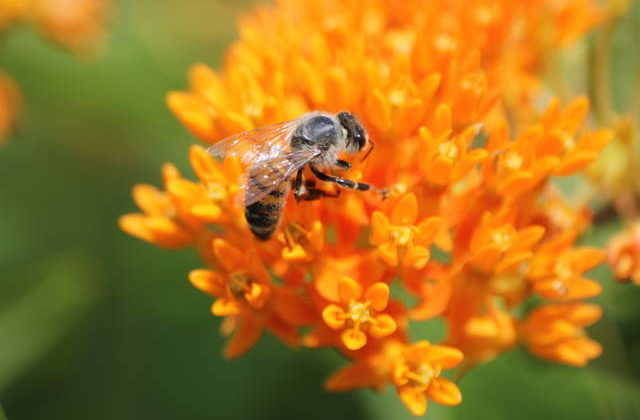
OSU program director shares tips on gardening for bees
Story by Sarah Allen
Photos courtesy of Denise Ellsworth

Story by Sarah Allen
Photos courtesy of Denise Ellsworth
A buzzing in the air means more than just honey. It also means food on the table and a beautiful, healthy environment. And while beekeeping has grown in popularity as a way to help bees, it’s not the only way. In fact, all a person needs is a green thumb.
The main idea when it comes to gardening for bees is to grow more flowers, according to Denise Ellsworth, program director for Honey Bee and Native Pollinator Education at Ohio State University’s Department of Entomology.
When starting a garden for bees, Ellsworth said it’s important to learn what grows well in your area. The best advice to keep in mind, she said, is: “Native plants for native bees.”
Some suggestions of plants suitable for this area included mountain mint. “It’s a real magnet for all kinds of pollinators,” Ellsworth said. “And it’s easy to grow if you have sun.”
“Milkweeds are really key as well,” she added. “They’re one of the best nectar sources.” Ellsworth also said that milkweeds are important for Monarch butterflies, as the nectar from them is “flight fuel.”
Ellsworth added that “trees are really important, too” as they are a “good early season food source.”
And, late in the season, shrubs and native perennials, such as asters and golden rods, can also be helpful to bees.
But gardening is only the beginning. Most bees, Ellsworth said, are not managed through beekeeping. Most are wild. As such, she said it’s important to protect places that bees use for nesting, resting and living. One way to help bees is to, at the end of spring, cut perennials at about knee- eight. Bees can nest in the hollow stems.
Some bees she said are solitary, which means they don’t have queens, workers or drones. “Just moms and dads,” she said. To protect bees like that, Ellsworth added, it’s important to not disturb the soil where they can make their homes.
Ellsworth also said that, while pesticides do play an important role, if pesticides get in the nectar of plants it could have negative impacts on bees.
Pesticides can affect bees’ learning and memory. For instance, they might not be able to find their way home, or they may forget which plants are best.
It’s important, Ellsworth said, to look at numerous strategies to “reduce the need for pesticides.”
One alternative, she said, is to introduce beneficial insects that can act as predators to the nuisance bugs.
And while many people may consider bees to be a nuisance themselves, Ellsworth said that they “play a keystone role in the environment” — and are not as dangerous as they may seem.
While there are bees that sting, there are those that can’t. In fact, many bees don’t have a stinger at all, or their stingers are very small. Most bees, Ellsworth said, “are more docile (and) … rarely, if ever sting.”
Bees are an integral part of food production, Ellsworth added, saying that roughly one in every three bites we eat can be traced back to pollinators.
But they also affect native plants and wildlife. Pollinators help ensure that trees, shrubs and wildflowers can grow and provide seeds and fruit for animals to eat.
“We encourage people to spread the word,” she said. “We definitely need the bees, and we need lots of bee fans.”
ID, 'source', true); $sourcelink = get_post_meta($post->ID, 'sourcelink', true); $sourcestring = '' . __('SOURCE','gabfire') . ''; if ($sourcelink != '') { echo "
$sourcestring: $source
"; } elseif ($source != '') { echo "$sourcestring: $source
"; } // Display pagination $args = array( 'before' => '' . __('Pages:','gabfire'), 'after' => '
', 'link_before' => '', 'link_after' => '', 'next_or_number' => 'number', 'nextpagelink' => __('Next page', 'gabfire'), 'previouspagelink' => __('Previous page', 'gabfire'), 'pagelink' => '%', 'echo' => 1 ); wp_link_pages($args); // Display edit post link to site admin edit_post_link(__('Edit','gabfire'),'','
'); // Post Widget gab_dynamic_sidebar('PostWidget'); ?>